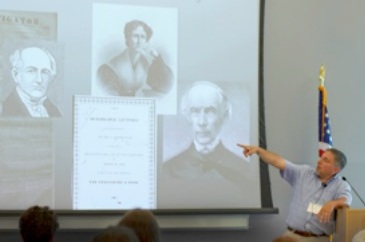By Blake Page
 When most of us think of the roots of free thought communities in the United States, we recall Madalyn O’Hair and the 1960’s. In his book An Infidel Body-Snatcher and the Fruits of his Philosophy, Dan Allosso shatters that misconception by detailing the life of Dr. Charles Knowlton, a physician who championed women’s rights in the early nineteenth century. While the book is a fascinating topic in itself, much of Dan’s presentation at our May Meeting addressed how a growing acceptance of free thought allowed Dr. Knowlton to contribute to the advancement of women’s rights and empiricism in medicine.
When most of us think of the roots of free thought communities in the United States, we recall Madalyn O’Hair and the 1960’s. In his book An Infidel Body-Snatcher and the Fruits of his Philosophy, Dan Allosso shatters that misconception by detailing the life of Dr. Charles Knowlton, a physician who championed women’s rights in the early nineteenth century. While the book is a fascinating topic in itself, much of Dan’s presentation at our May Meeting addressed how a growing acceptance of free thought allowed Dr. Knowlton to contribute to the advancement of women’s rights and empiricism in medicine.
Dr. Knowlton, Dan explained, was among the first to publicly acknowledge the concept of women’s rights in his pithy sixty-page publication, The Fruits of Philosophy (1831). This book, which described nineteenth-century means of birth control, also espoused the right of women to control their bodies and the responsibility of both parents to limit family size. This work conflicted with stagnant medical philosophy which was largely influenced by religious beliefs about competitive breeding. It was only through the work of freethinkers that such bold new ideas could be disseminated. Many of us may think the recent Women in Secularism Conferences represent the scope of the history of cooperation between secularism and feminism. The discussion with Dan clearly showed the history of this allegiance goes much farther back.
Of course, attitudes toward birth control weren’t the only problem with nineteenth-century medicine. The fundamental problem was the lack of empiricism. Most of us consider the development of medicine as a topic unrelated to secularism or freethought. Dan argued that the freethinking activists proved essential turning medicine away from doctrinal thought and toward empiricism. Dr. Knowlton was just such an activist. His works on materialism, his exposure of quackery, and his advocacy for the need of scientific inquiry contributed significantly to the advancement of modern medicine. Of course, this did not happen in a vacuum. In the process of advocating for reform, Dr. Knowlton found himself involved in a very active community of freethinkers who were promoting their ideas through newspapers, lectures, dances, and many other activities.
Dan argues that the real history of free thought has been obscured by Christian Revisionists, the most well-funded historians of our times. Because of this, much of the history of our country has been obscured with fantastic claims of a uniformly Christian government and American population from time immemorial. Dan’s research into the life and work of Dr. Knowlton exposes not just the incredible contributions of one man to the scientific advancement of medicine, but also the surprising extent of the nineteenth century American freethinking. Books like Chris Rodda’s Liars for Jesus provide strong evidence against the absurdity of revisionists’ claims. Dan Alloso begins to set the record straight by sharing the story of freethinking pioneers.

